Reveals Ambassador Isumbingabo of Rwanda at the National Day party
By Publisher Lee Kyung-sik with VC Cho Kyung-hee, Reporter Paul Kim
Ambassador Emma Françoise Isumbingabo of the Republic of Rwanda in Seoul said, “Over the past two decades the relations between Rwanda and Korea have grown attaining the level of “Key Partner Country” for development cooperation.”
Speaking at a reception she hosted at the Millennium Seoul Hilton on July 4, 2019 in celebration of to mark the 25th anniversary of the Liberation of the Republic of Rwanda, Ambassador Isumbingabo introduced that the visits in 2008, 2011 and 2014 to South Korea by President Paul Kagame have further bolstered the bilateral relations, laying the basis for deepening existing ties and broadening the parameters of cooperation.”
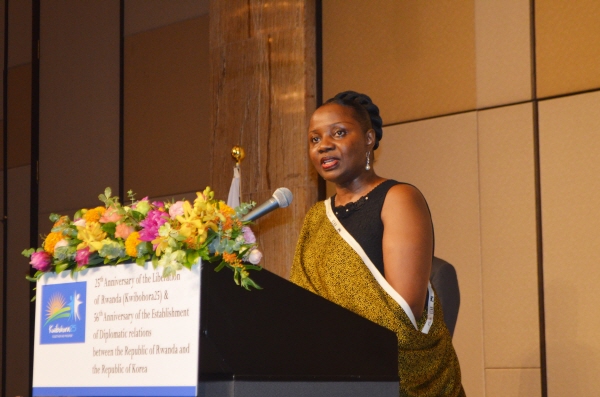
Then said Ambassador Isumbingabo, “The establishment of diplomatic missions in respective capitals have greatly enhanced cordial and constructive ties in various fields of mutual interest namely: political, economic and socio-cultural area.”
“In addition,” said, “the two countries share similar views on many regional and international issues of common concerns and it is in this context that Rwanda supports efforts to establish peace, stability and denuclearization of the Korean Peninsula through dialogue and diplomacy.”
Then she added: “Trade and Investments has also shown upward trends over the years. Though we experience some level of imbalance of trade, the exports of Rwandan coffee have remained strong and prospects for increased volumes are high due to the quality and wide knowledge of the product in Korea.”
(See further details of her speech toward the end of this report.)
Then came congratulatory remarks from Vice Speaker Lee Ju-young of the National Assembly of Korea, who is concurrently the president of the National Assembly’ s Forum for Africa’ s New Era.
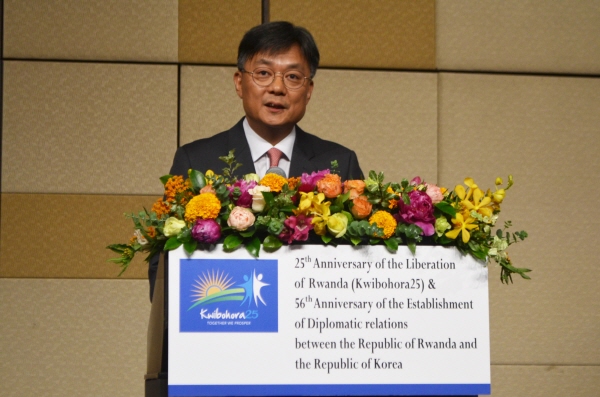
He said: “The National Assembly of Korea will also intensify its efforts to strengthen friendship with Rwanda. In 2013, members of the National Assembly established the National Assembly’ s Forum for Africa’ s New Era. From then on, we have actively engaged with issues around Africa. Members of the New Era Forum will continue to remain as friends of Africa, and friends of Rwanda.” (See excerpts from his speech at the end of this report.)
The reception was attended by many distinguished guests from all segments of Korean society as well as from the international community, the Seoul Diplomatic Corps, in particular.
Among the guests in attendance were Deputy Speaker Lee Ju-young of the National Assembly, Korean Ambassador Chang Jae-bok of the Ministry of Foreign Affairs for Public Diplomacy and Director General Hong Jin-wook of the African and Middle Eastern Affairs Bureau of the Korean Ministry of Foreign Affairs.
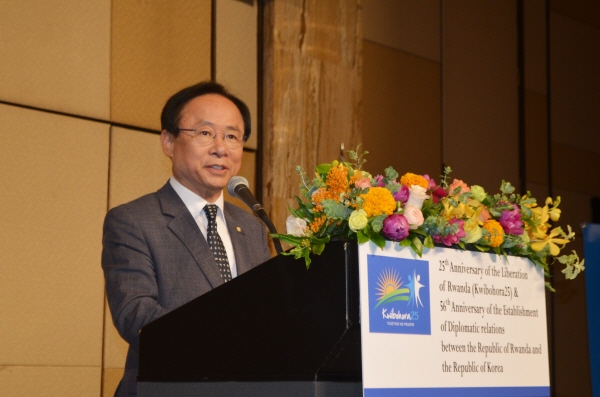
From the Seoul Diplomatic Corps came many ambassadors with their spouses. They included Ambassadors Long Dimanche of Cambodia, Antoine Azzam of Lebanon, Chafik Rachadir of Morocco, Harry Harris of the United States and Vitaliy Fen of Uzbekistan. There were ambassadors and their spouses from dozens of other countries whom we, with due apology, fail to introduce for space reasons.
From the Korean society came many civic figures from various segments of Koran society , including the news media, from which came many publishers and editors who include Publisher-Chairman Lee Kyung-sik of The Korea Post media with his Vice Chairperson Cho Kyung-hee who had a wide range of rich knowledge of the diplomatic community thanks to her status as the spouse of a European ambassador.
There were interesting cultural performances of Rwanda, which included a group of absolutely amazing cultural performers from the Rwandan community living in Korea, named Umucyo to perform the traditional Rwandan music.
They were accorded warm and enthusiastic applauses from the Korean guests, as well as the international guests, as they were very interesting as well as exotic and beautiful to the Korean eye. The group name is called Umucyo cultural group in South Korea.
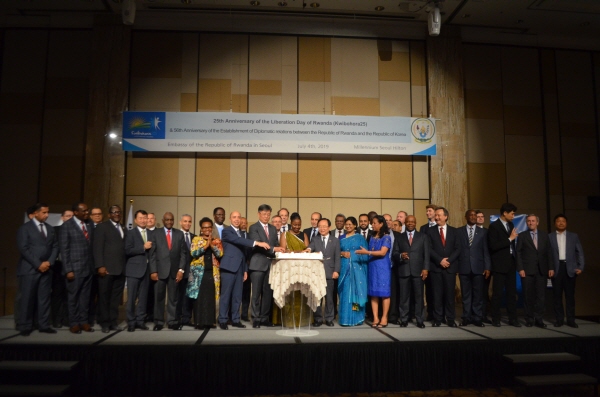
According to the Korean Ministry of Foreign Affairs, following the establishment of diplomatic relations with Rwanda in 1963, Korea opened its Embassy there for the first time in the 1970s, and again in the 1980s, before circumstance forced it to be closed again. The Embassy was finally reopened on May 14, 2011.
Rwanda is located in central Africa just south of the Equator. Nevertheless, the country’s climate is moderate all year round, and its landscape provides magnificent beauty. As a result, Rwanda became one of the most densely populated countries in Africa with over 12 million people living in an area similar to the size of the two Gyeongsang provinces of Korea put together. Rwandans are proud of their country, calling it the ‘Land of a Thousand Hills,’ or ‘Land of Eternal Spring.'
Overcoming the tragedy of 1994, Rwanda has successfully continued its journey of national reconciliation and economic development. Today, Rwanda attracts the world’s attention with its remarkable socio-economic achievements and development potential.
For years, the most noticeable area of the bilateral relationship has been development cooperation, which has focused on the field of rural development, education and ICT. Many volunteers from the Korea International Cooperation Agency, and a number of NGOs are currently working throughout Rwanda with passion and devotion.
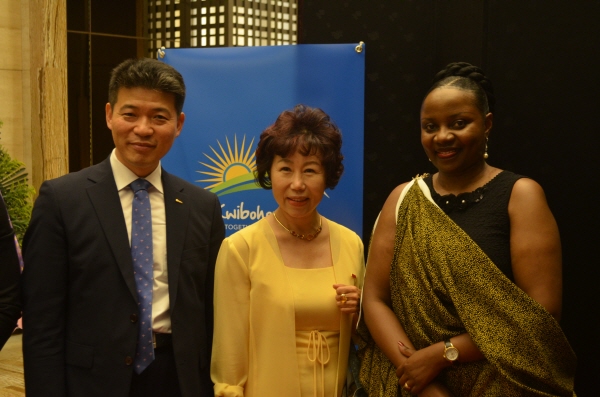
Korea and Rwanda have also been closely cooperating in establishing a nationwide 4G/LTE network across Rwanda. Through this exemplary public-private partnership between the two countries, Rwanda’s thousand hills are now more connected than ever.
Excerpts from the speech of Ambassador Isumbingabo of Rwanda:
It is my honor and privilege to welcome you to this celebration of the 25th Anniversary of the Liberation of the Republic of Rwanda. Thank you for honoring us with your presence. Our special thanks go to our chief guest Ambassador Chang Jae-Bok, the Ambassador for public diplomacy in the ministry of foreign affairs and Honorable Lee Ju-young, Deputy Speaker of the Korean National Assembly and President of the National Assembly’s forum for Africa’s New Era.
In these past 25 years, Rwanda has emerged from the obscurity of a nearly failed state to become a country recognized among the community of nations.
On this important Day, we express gratitude to the heroic men and women whose efforts and sacrifices led to Rwanda’s liberation on July 4th, 1994.
The 1994 Genocide against the Tutsi in Rwanda left the country destroyed in all its aspects. With more than a million killed in just 100 days, the country was on its knees with a stagnating economy which had dropped by 50% with inflation rising to 64%. The country had to cope with a large number of displaced people with more than 140,000 Genocide suspects in overcrowded prisons. Every single Rwandan family endured big losses and it was a difficult time for all with little hope for tomorrow. However, the Rwandan Government which brought an end to the 1994 genocide against the Tutsi, believed “Unity and Reconciliation among Rwandans” could be the cornerstone in rebuilding the nation. Rwandans therefore embarked on the journey towards promoting Peace, Unity and Reconciliation for Sustainable Development, guided by the Government through policies and strategies providing roadmaps and monitoring tools well designed to measure the achievements and propose new solutions for countering new challenges.
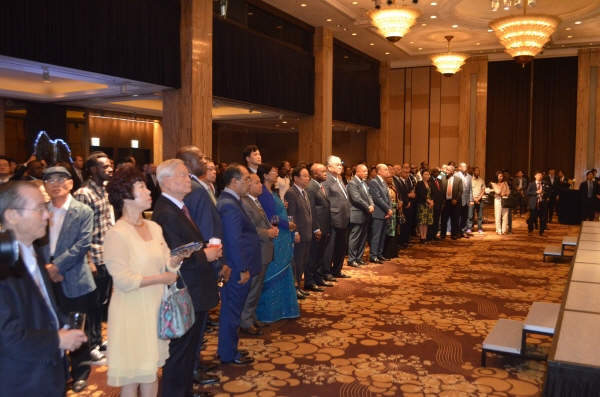
After the 1994 Genocide against the Tutsi in Rwanda was stopped, the entire socio-economic fabric of the nation was destroyed, the infrastructure equally dilapidated. A complete restart was required. As part of the efforts to reconstruct the country and promote a shared national identity, the Government of Rwanda drew on aspects of Rwandan culture and traditional practices to enrich and adapt its development programs to the country’s needs and context.
The result is a set of Home Grown Solutions; which are culturally owned practices translated into sustainable development programs. They include (i) “Gacaca” which refers to the small clearing where a community would traditionally meet to discuss issues of concern (ii) “Abunzi” which can be translated as ‘those who reconcile’ or ‘those who bring together’ (iii) “Girinka” translated as ‘may you have a cow’ and describes an old cultural practice in Rwanda whereby a cow was given by one person to another as a sign of respect and gratitude (iv) “Imihigo” which means ‘to vow to deliver,’ and now used for Government performance contracts. (v) “Itorero” is a cultural school where Rwandans learn language, patriotism, social interactions, sports, dancing, and songs. (vi) “Ingando” which means ‘going to stay’ in a place far from one’s home, often with a group, for a specific reason (vii) “Umuganura” which means ‘First-Fruits Festival.’ (viii) “Umuganda” meaning ‘coming together in common purpose to achieve an outcome’ (ix) Umushyikirano: National Dialogue Council which takes place once in a year, gathering Rwandans from home and abroad to discuss issues related to Government performance, (x) and lastly, “Umwiherero” which means “retreat,” a concept that is now practiced annually bringing together the entire leadership corps to discuss the country’s development.
These cultural practices, which have now become the norm, have enabled Rwanda to achieve a lasting peace through reconciliation and a home-grown better working justice system.
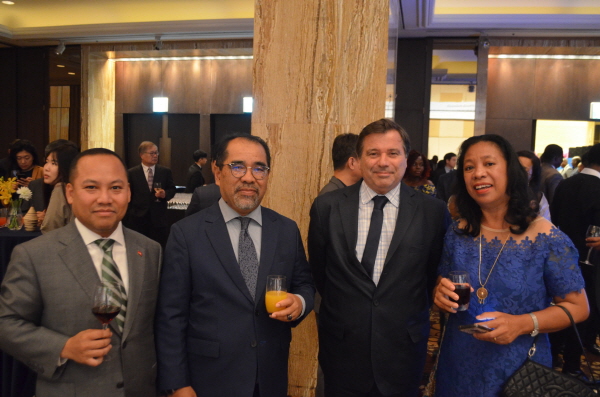
Rwanda has also implemented a number of policies to shape its economic transformation agenda and these policies continue to evolve depending on changing needs of the economy. Rwanda’s vision is to build a knowledge-based economy and to become a private sector led middle income country by 2020. Rwanda’s ambitious program for development is encapsulated in Vision 2020 and implemented through a series of 5 years’ strategies called “The Economic Development and Poverty Reduction Strategy (EDPRS)” that were started from the year 2000 as mid-term framework to implement the Government’s long-term development agenda. The EDPRS was based on three pillars designed to accelerate economic growth and promote human development, investing in improving the climate for business investment, thereby achieving private-sector growth.
After the implementation of two, five-year Economic Development and Poverty Reduction Strategies—EDPRS (2008-12) and EDPRS-2 (2013-18), under which Rwanda experienced robust economic and social performances, the growth averaged 7.5% while per capita growth domestic product (GDP) grew at 4.7% annually.
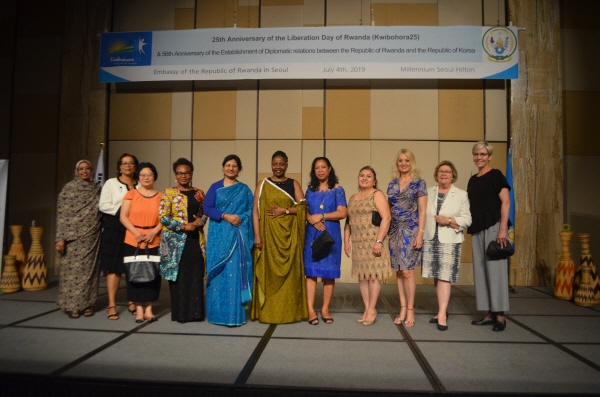
This strong economic growth was accompanied by substantial improvements in living standards, with a two-thirds drop in child mortality and near-universal primary school enrollment. A strong focus on homegrown policies and initiatives has contributed to significant improvement in access to services and human development indicators.
Today, Rwanda aspires to Middle Income Country (MIC) and High-Income Country (HIC) status by 2035 and 2050, respectively. The Vision will be effected through a series of seven-year National Strategies for Transformation (NST).
The National Strategy for Transformation (NST1) has been developed as implementation instrument for the remainder of Vision 2020 and for the first four years of the Vision 2050. It also integrates far sighted, long range global and regional commitments by embracing the Sustainable Development Goals (SDGs), the Africa Union Agenda 2063 as well as the East African Community (EAC) Vision 2050.
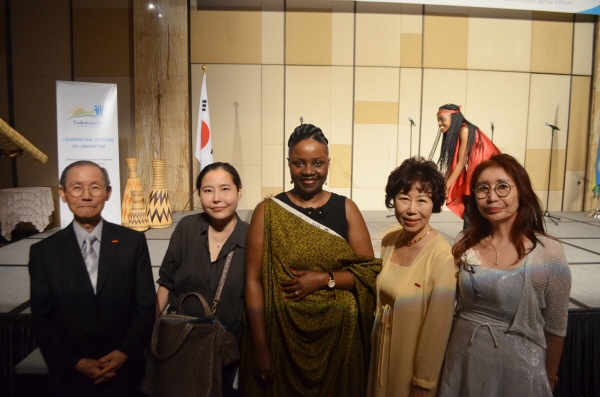
Diplomatic relations between Rwanda and Korea were established in 1963, today we are celebrating the 56th anniversary. Over the past two decades our relations have grown attaining the level of “Key Partner Country” for development cooperation. The visits in 2008, 2011 and 2014 to South Korea by HE Paul Kagame, President of the Republic of Rwanda have further bolstered the bilateral relations, laying the basis for deepening existing ties and broadening the parameters of cooperation.
The establishment of diplomatic missions in respective capitals and the KOICA’s office operations on Rwandan soil have greatly enhanced cordial and constructive ties in various fields of mutual interest namely: political, economic and socio-cultural area. In addition, the two countries share similar views on many regional and international issues of common concerns. It is in this context that Rwanda supports efforts to establish peace, stability and denuclearization of the Korean Peninsula through dialogue and diplomacy.
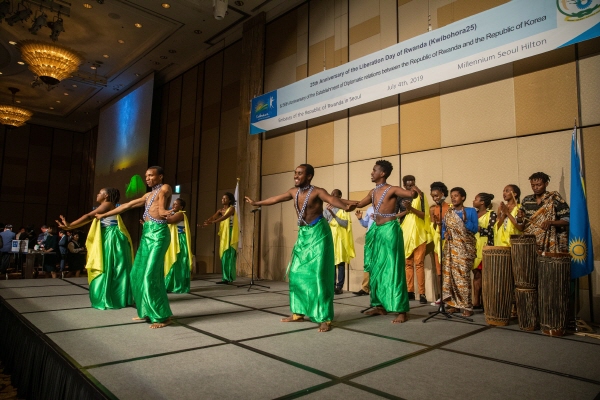
Trade and Investments has also shown upward trends over the years. Though we experience some level of imbalance of trade, the exports of Rwandan coffee have remained strong and prospects for increased volumes are high due to the quality and wide knowledge of the product in Korea.
At the regional level, Rwanda is focused on bringing peace and security in Africa. Rwanda is contributing to peacekeeping missions and is one of the largest contributors to peacekeeping missions in Africa. Rwanda also plays an important role for the stability of the Great Lakes region.
In two years as chairperson of the AU reforms committee and one year as AU chairperson, HE Paul Kagame, President of the Republic of Rwanda succeeded in changing the management of the continent’s affairs. In addition, in March 2018 President Kagame spearheaded the launch and initial signature process of the African Continental Free Trade Area agreement, which has now been ratified by 22 countries and has been therefore in force on May 30th of this year. Rwanda was also the first country to sign and ratify the Protocol on the Free Movement of People. These represent big steps towards African integration.
As I conclude my remarks, I would like to thank the people and organizations that have worked closely with us in these past 25 years. I sincerely express my gratitude to you all for all the support you have given me and the embassy in pursuing our duties to promote our two nations.
Excerpt s from the congratulatory remarks of Vice Speaker Lee Ju-young:
Mwiriwe!
Twenty-five years ago, on July 4th 1994, the darkest chapter in Rwanda was brought to close, and a new era began. On that day, the Rwanda Patriotic Front, which firmly stood up against the Genocide against the Tutsi, liberated the capital city Kigali and ended the atrocities.
From April 7th to July 4th, one million people lost their lives in a period of just 100 days. People all around the world annually remember those days and share the spirit of “ Never Again.”
Today, we celebrate the “Liberation Day” when the peace and liberty, security and hope finally rose in Rwanda. It is a great honor for me to join you on this meaningful “ Kwibohora 25” celebration.
Rwanda has successfully overcome the tragedy in 1994 through “Remember, Unite, and Renew.” Rwandan people “remember” the victims of Genocide and also the fact that such kind of atrocities should never happen again elsewhere in the world. To do so, we should “ unite” to proceed to the bright future. Rwanda is “ renewing” every aspect of society, like healthcare, education, and economy upon the foundation of the shared vision.
As a result, Rwanda has become a leading development model in Africa, in areas of high economic growth rate, good governance and business environment, and decent healthcare and stable security.
Korea shares many similarities with Rwanda. Both countries had experienced colonial rule and a tragedy of fratricidal war. However, both countries have overcome the ruin of the past and achieved rapid development. Based on those similarities, Korea will be the important everlasting partner of Rwanda to support its reconciliation and recovery efforts.
Rwanda is one of the priority partner countries based on the Country Partnership Strategies. Under CPS, Korea cooperates with Rwanda in areas of Education, Rural Development, and Information Technology.
Korea wants to further such cooperative efforts with Rwanda, following the firm leadership of Honourable Excellency Paul Kagame, President of the Republic of Rwanda, which leads policy reforms of the African Union and implementation of the African Continental Free Trade Area.
The National Assembly of Korea will also intensify its efforts to strengthen friendship with Rwanda. In 2013, members of the National Assembly established the National Assembly’ s Forum for Africa’ s New Era. From then on, we have actively engaged with issues around Africa. Members of the New Era Forum will continue to remain as friends of Africa, and friends of Rwanda.
I am very proud of our shared efforts to build a prosperous future. Let us celebrate peace and liberty, security, and hope made by the Rwandan people. Let us not forget that the fruits we now enjoy are based on the sacrifices of victims and heroes, especially the Rwandan people who dared to stand up against the Genocide against the Tutsi. Based on the memories, let us walk together. Murakoze cyane!

